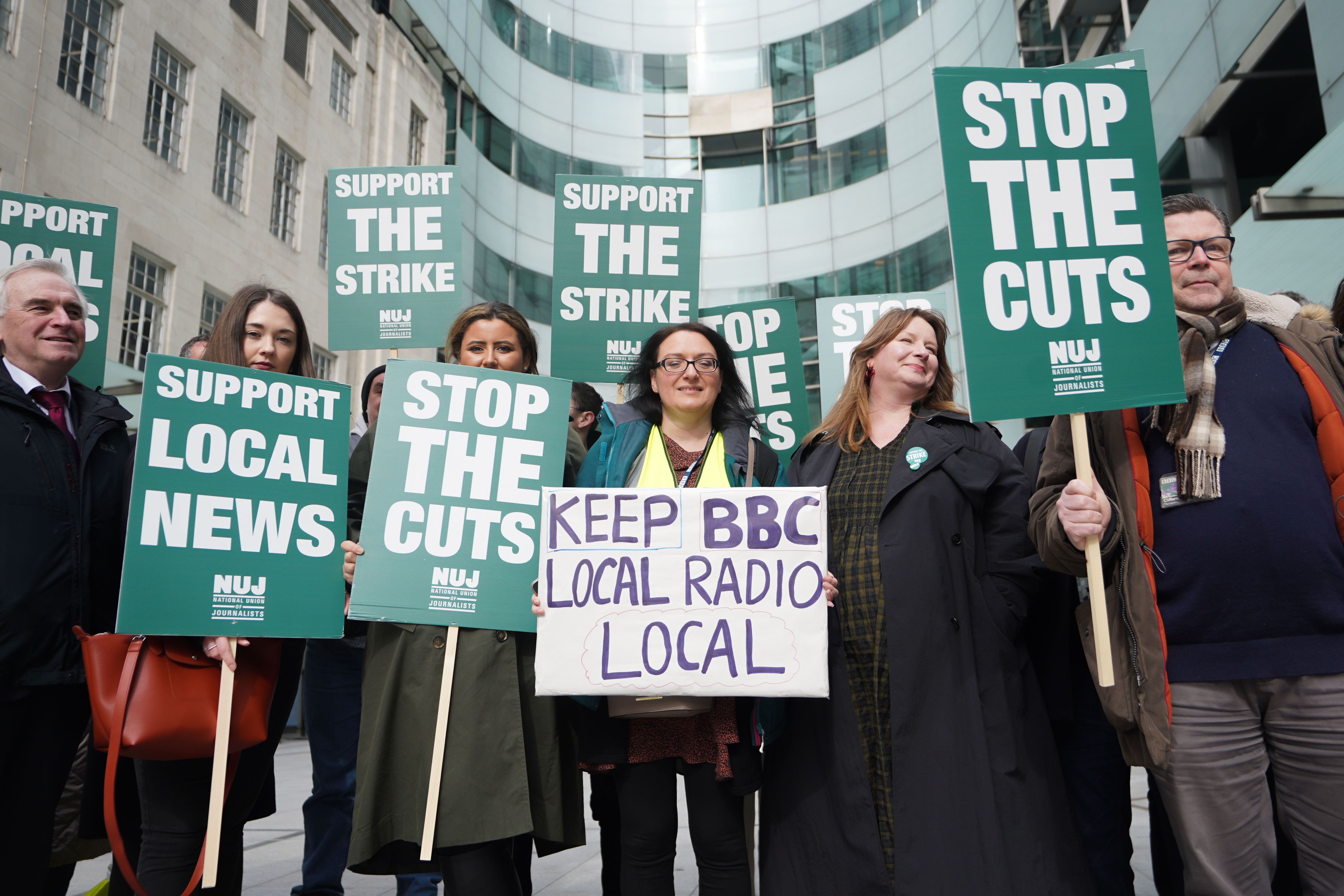BBC journalists forced to strike over proposed local radio cuts – John McDonnell
A National Union of Journalists official said faith in BBC boss Tim Davie is at an ‘all-time low’.

BBC journalists have been “forced to strike” by proposed cuts to local radio, former Labour shadow chancellor John McDonnell has said.
Mr McDonnell, secretary of the National Union of Journalists (NUJ) cross-party parliamentary group, was among those on a picket line outside Broadcasting House on Wednesday.
A union official added that faith in BBC director-general Tim Davie is at an “all-time low” after the suspension and reinstatement of presenter Gary Lineker over tweets criticising the Government.
The NUJ said about 1,000 journalists are expected to walk out across the day, as Chancellor Jeremy Hunt delivers his Spring budget, prompting disruption to the local TV and radio schedule in England.
The strike means many 1.30pm and 6.30pm regional TV news programmes across England are not being broadcast. Programming in Scotland, Wales and Northern Ireland remains unaffected.
About 25 journalists left Broadcasting House in London just after 11am, chanting “save local radio” and “keep local radio local”.
Others held placards reading “stop the cuts” and “save local news”, while one homemade sign read “keep BBC radio local”.
Mr McDonnell told the PA news agency: “These workers have been forced to strike and this isn’t about pay or anything like this.
“This is about maintaining their professional standards in the BBC and local journalism.
“We’ve got to get across to the BBC itself just how important this is because as soon as you start undermining one of the foundations of public service broadcasting like this, the whole edifice of the BBC comes under challenge.
“So these workers have been forced – they’ve tried every other negotiation with the BBC to make them see sense.”
Paul Siegert, NUJ national broadcasting organiser, told PA: “I don’t think we’re at the stage where we’re calling on Tim Davie to resign yet.
“But I think faith in him is certainly at an all-time low and he needs to work hard to rebuild that faith over the coming weeks and months.”
Speaking about the row over impartiality between Lineker, the Government and BBC management, Mr Siegert added: “I think what the Gary Lineker situation showed was that the management are out of touch, and that’s being illustrated today with the strike.
“They are making changes which the staff do not agree with in local radio, and I think we saw the strength of feeling over the weekend when people supported Gary Lineker.
“And I think if management had realised that there was that kind of level of support, they never would have suspended Gary Lineker in the first place.”
He added that BBC staff are “resigned to the long haul” and that “if we can’t get back around the negotiating table” the union would talk about other strike dates.
These include local election results day on May 5 “when local radio plays a massive part in explaining the results and being at counts across the country” and the King’s coronation on May 6.
Susana Mendonca, a political reporter for BBC Radio London and its NUJ rep, told PA “We’re not striking about pay.
“I know there are a lot of people out striking today for all sorts of different reasons but we’re not here striking about pay.
“We’re here striking because we believe in protecting that key pillar of public service broadcasting and we feel that this move away from the localism element of local radio will mean that our audiences don’t get properly served.”
The action comes in response to the BBC’s proposal in October that local radio stations share more content and broadcast less programming unique to their areas.
This would see local programming restricted after 2pm and afternoon programmes across England shared between its 39 local radio stations.
The NUJ previously said the plans would lead to a loss of posts and journalists having to re-apply for their own jobs.
Under the proposals, the broadcaster previously confirmed 48 jobs would be lost across local staffing in England.
Jason Horton, director of production for BBC Local, said on Wednesday in a blog post: “We’d like to apologise to our audience for the disruption that this action will cause to the BBC’s local TV and radio services in England.
“We will of course continue to engage with the trade union and do everything possible to minimise the impact on colleagues affected by our planned changes.
“We have assured teams working across our 39 BBC Local bases that we are maintaining overall investment and staffing levels in local services and we’re working hard to minimise the risk of compulsory redundancies.
“But change is essential. If our local services are to remain relevant in an increasingly online and on-demand world of live and increasing on-demand services, we must change.”
A BBC spokesman said the broadcaster had “tried to minimise disruption as much as possible”.
He added: “We are obviously disappointed that the strike has gone ahead. We have a plan to modernise local services across England, including more news journalists and a stronger local online service, which will see no overall reduction in staffing levels or local funding.
“Our goal is a local service across TV, radio and online that delivers even greater value to communities.
“We will continue to engage with the trade union and do everything possible to minimise the impact on staff.”
Bookmark popover
Removed from bookmarks